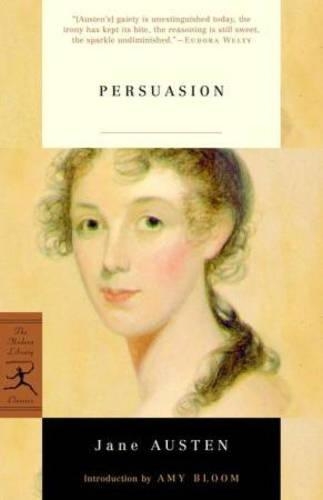
Persuasion
(Paperback)
Available Formats
Paperback
Published: 23rd May 2012
Paperback
Published: 15th June 2001
Hardback
Published: 25th March 2025
Hardback
Published: 29th November 2022
Paperback
Published: 1st July 2006
Hardback, New edition
Published: 15th October 2019
Paperback
Published: 17th November 2011
Hardback
Published: 14th December 2011
Paperback
Published: 1st January 2016
Hardback
Published: 12th July 2016
Paperback
Published: 1st July 2023
Hardback
Published: 2nd December 2025
Hardback
Published: 15th May 1992
Paperback
Published: 27th May 2025
Hardback
Published: 18th November 2025
Paperback
Published: 5th February 2008
Paperback, New edition
Published: 5th June 1993
Hardback
Published: 1st November 2018
Other book format, Bonded Leather
Published: 1st March 2019
Paperback
Published: 17th March 2011
Publishing Details
Persuasion
By (Author) Jane Austen
Introduction by Uzma Jalaluddin
Random House USA Inc
Modern Library Inc
15th June 2001
United States
Classifications
General
Fiction
823.7
Short-listed for BBC Big Read Top 100 2003
Physical Properties
Paperback
256
Width 132mm, Height 201mm, Spine 14mm
215g
Description
Austen's satire of England society and love's place within it, this edition features a new with commentary, notes and reading group guide.
Reviews
Critics, especially [recently], value Persuasion highly, as the authors most deeply felt fiction, the novel which in the end the experienced reader of Jane Austen puts at the head of the list. . . . Anne wins back Wentworth and wins over the reader; we may, like him, end up thinking Annes character perfection itself. from the Introduction by Judith Terry
Author Bio
Jane Austen was born in Steventon, Hampshire, on December 16, 1775. Her father, the Reverend George Austen, was rector of Steventon, where she spent her first twenty-five years, along with her six brothers (two of them later naval officers in the Napoleonic wars) and her adored sister, Cassandra. She read voraciously from an early age, counting among her favorites the novels of Samuel Richardson, Henry Fielding, and Fanny Burney, and the poetry of William Cowper and George Crabbe. Her family was lively and affectionate and they encouraged her precocious literary efforts, the earliest dating from age twelve, which already displayed the beginnings of her comic style. Her first novels, Elinor and Marianne (1796) and First Impressions (1797), were not published. The gothic parody Northanger Abbey was accepted for publication in 1803 but was ultimately withheld by the publisher. In 1801 the family moved to Bath, where for four years Austen was able to observe the fashionable watering place that would later figure prominently in her fiction. Austen was sociable in her youth, and was briefly engaged in 1802. Two years later she began work on The Watsons, a novel that remained unfinished. After the death of her father in 1805, she lived with her mother and sister in Southampton for a few years before moving with them to a cottage at Chawton in Hampshire. This would be her home for the rest of her life, and she wrote many of her novels in its parlor. She continued to revise her earlier unpublished work, and in 1811 a version of Elinor and Marianne was published as Sense and Sensibility, followed two years later by Pride and Prejudice, a reworking of First Impressions. In the next few years she published Mansfield Park (1814) and Emma (1816). Austen became ill in 1815, perhaps with Addison's disease, and she died on July 18, 1817. Persuasion, her last novel, and the earlier Northanger Abbey appeared the following year. Of her last days her brother wrote- 'She wrote whilst she could hold a pen, and with a pencil when a pen was become too laborious. The day preceding her death she composed some stanzas replete with fancy and vigour.' Although Austen received some praise from her contemporaries--notably Sir Walter Scott, who discerned in her work 'the exquisite touch, which renders ordinary commonplace things and characters interesting, from the truth of the description and the sentiment'--her detractors included Charlotte Bronte ('very incomplete and rather insensible') and Ralph Waldo Emerson ('vulgar in tone, sterile in artistic invention'), and her books did not immediately find a wide readership. The turn in her reputation came late in the nineteenth century, and has been succeeded by an enduring popularity and widespread critical praise in the twentieth.
